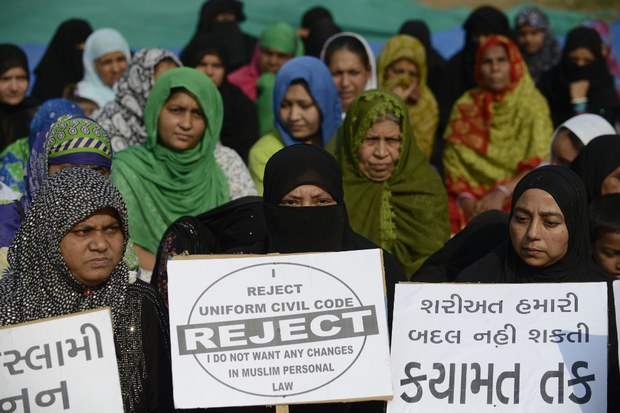India’s Top Court Begins Hearing on Controversial Muslim Divorce Practice
2017.05.11
New Delhi
 Indian Muslim women participate in a rally in Ahmedabad to oppose efforts to outlaw the practice of triple talaq, Nov. 4, 2016.
Indian Muslim women participate in a rally in Ahmedabad to oppose efforts to outlaw the practice of triple talaq, Nov. 4, 2016.
Updated at 8:08 a.m. ET on 2017-05-12
India’s Supreme Court will examine if a controversial practice of unilateral divorce among Muslims is fundamental to their religion, the court said Thursday as it began hearing a cluster of petitions filed by Islamic women challenging the constitutional validity of triple talaq.
The country’s apex court said it would take into consideration laws in Islamic nations before delivering its verdict on the legality of the practice, which allows a Muslim man to part from his wife by uttering or writing the word “divorce” three times.
The five-member bench, headed by Chief Justice of India J.S. Khehar, includes judges belonging to different religious communities. While Shekhar is a Sikh, Kurian Joseph is a Christian; Rohinton Fali Nariman is a Parsi; U.U. Lalit is a Hindu, and Abdul Nazeer a Muslim.
The court said it was banding together seven petitions filed separately by two women’s rights groups and five victims of triple talaq so it could deliver a speedy verdict.
Influential Muslim bodies such as the All India Muslim Personal Law Board (AIMPLB) and Jamiat Ulama-i-Hind, which resisted attempts to modernize Sharia-based laws, will challenge the petitions that seek to reform Muslim personal law, members of the groups said.
The Indian government, led by the Hindu-nationalist Bharatiya Janata Party (BJP), last year submitted an affidavit in court, saying it was opposed to the practice of triple talaq on grounds of gender equality and secularism.
“Any practice by which women are left socially, financially or emotionally vulnerable or subject to the whims and caprice of men-folk is incompatible with the letter and spirit of the constitution,” the government said.
The court, which for the first time in Indian judicial history is hearing a case during its summer vacation, gave two days each to the prosecution and defense to present arguments and a day each for rebuttals.
“Each side can argue whatever they want but there should not be any repetition,” the bench said, according to the Press Trust of India. The court added that the arguments must only be limited to whether triple talaq is an integral part of Islam and if banning it would mean curbing the fundamental right to religion, as promised in the constitution.
Women speak
Zakia Soman of the Mumbai-based Muslim women’s rights group Bharatiya Muslim Mahila Andolan (BMMA), one of the petitioners in the case, said she was confident the court “would rule in favor of gender equality.”
“We are confident that we will get a verdict in our favor. Not just that, the court will also abolish the board (AIMPLB),” Soman told BenarNews. The AIMPLB governs Muslim personal law in Hindu-majority India, which has a population of about 180 million Muslims.
There is no single civil law code for officially secular India’s 1.25 billion citizens.
“Whatever the board has been saying is informed by their extremely patriarchy-driven mindset. They have resorted to enforcing such ridiculous laws just to stay in existence,” Soman said.
Facing jibes from Islamic scholars that the Quran does not approve the practice of triple talaq, the AIMPLB last month passed a resolution that whosoever divorces his wife by uttering the word “divorce” three times in one sitting will face a “social boycott.” It also called for “non-interference by courts and the government in matters of Muslim personal law.”
“The concept of triple talaq, according to the Quran, is that there should be a gap of three months before the word ‘divorce’ is uttered for the third and final time. In the interim period, the couple should have enough time and opportunity to reconcile,” Shaista Amber, president of the All India Muslim Women Personal Board, told BenarNews.
But Maulana Mohammad Wali Rahmani, general secretary of the AIMPLB, said: “People can say anything and express whatever they like. We want the court to give its ruling based on the constitution and not on personal opinion.”
“Triple talaq is a part of our religion, and freedom to practice our respective religions is a fundamental right of every Indian citizen according to the constitution,” Rahmani told BenarNews.
The BJP-led government stood by its stance that the practice of unilateral divorce was illegal.
“Triple talaq is legally wrong, which is why we oppose it,” BJP spokesman Bizay Sonkar Shastri told BenarNews, adding that the ruling party would welcome a solution to the issue.
“Any section of people struggling with any fundamental problem should get social and political support. Our party will support any such social and political solution,” he said.
Soni Sangwan in New Delhi contributed to this report.
An earlier version gave a wrong name for the chief justice of India.







